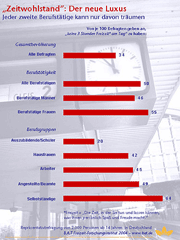"Time prosperity": the new luxury
Germany, when does the workday end? The dream of a "collective amusement park" is definitively over. And the much-predicted "leisure society" must also be postponed indefinitely. The workload of Germans is increasing, money is getting tight, and time pressure is creeping into private households. One in three Germans (341,000) has less than three hours of free time available. And for half (501,000) of working people (women: 551,000 – men: 461,000), the workday ends no earlier than 7:00 p.m. and is over less than three hours later. This is according to a representative survey conducted by the BAT Leisure Research Institute, in which 2,000 people aged 14 and over were asked about their available free time each workday.
„Some time-consuming after-work rituals have to be curtailed. Leisure time is becoming scarce, and not just money,“ says Prof. Dr. Horst W. Opaschowski, head of the BAT Institute. „Extended working hours without wage compensation and the trend toward the 40-hour week can have far-reaching consequences: On the one hand, there is widespread satisfaction with job and location guarantees, while on the other hand, there are complaints about lost leisure time and increasing time constraints. Job security doesn't come for free: It costs a piece of private life. Economic growth cannot be achieved with a leisure-oriented mentality alone.“ Conversely, employers also need leisure consumers who have enough time for shopping and dining out, going to the cinema, and weekend trips. The desire to consume can hardly develop under time pressure. Consumers are becoming time savers.
Time affluence is becoming a luxury – especially for the self-employed.
Almost half of blue-collar workers (451,300), white-collar workers, and civil servants (491,300 each) estimate they have less than three hours of free time per day. Among the self-employed and freelancers, however, almost two-thirds (641,300) feel more involved in their work than they can truly relax after hours. Professor Opaschowski states: "Those who choose self-employment today have little free time, hardly any vacation, and sometimes work 70-hour weeks, pushing themselves to the brink of self-exploitation." The reality is quite different from the ideal: the self-employed have less autonomy over their time and carry work-related problems into their free time. The subjective impression arises that there is virtually no time left for leisure.
Among the working population, only trainees occupy a privileged position with regard to their personal time freedom. Most young people (54%) even have more than four hours of personal leisure time available daily, "in which they can do whatever they enjoy." Only retirees report having even more free time (71%). Professor Opaschowski: "The 20th century went down in the history of modern work as the century of leisure. In the 21st century, more labor productivity is needed than a reduction in working hours."„
Especially working people are increasingly finding that leaving the workplace doesn't mean their workday is over. Transitional activities such as the commute home, errands, shopping, housework, childcare, and social obligations within the family, neighborhood, and community initially "cost" time and take it away from their personal leisure time.
Productivity and usefulness:
Work continues during leisure time.
A historically new trend in time budgeting is emerging: fulfilling mandatory daily tasks can take more time than paid employment. This so-called "obligatory time" must then be increasingly filled with do-it-yourself projects (instead of paid skilled trades) and the systematic cultivation of contacts and social relationships. Opaschowski: "People used to dream of time affluence; now they are growing up with a lack of time." What previously applied only to professional work is now also demanded of private life: productivity and usefulness. And that means, specifically: family care, maintaining one's standard of living, and preserving health.
Behind the new yearning for leisure time lies the age-old dream of a good life – beyond online shopping, telebanking, and last-minute trips. Family and raising children, in particular, place strict limits on personal leisure time. Therefore, women especially distinguish clearly between family leisure time and "personal leisure time," which they want to have entirely for themselves and not just share with their partner and children.
A longer version of Horst W. Opaschowski's article on "Time Wealth" can be found in the press lounge on our homepage (www.bat.de).
Early analyses and forecasts from the BAT Institute
„"By 2010 at the latest, there will be a new development in time budgets. The time spent on obligations, the time for everyday commitments and liabilities, will increase rapidly."“
BAT Leisure Research Institute (ed.): How will we live after the year 2000? Hamburg 1988
„"The 'leisure society' is a legend. Leisure researchers did not invent the 'leisure society' and never called or described it as such. Quite the contrary: The leisure society was exposed as a myth and a legend at an early stage."’
BAT Leisure Research Institute (ed.): The Challenge of Leisure, Hamburg 1990
GERMANY 2020.
How we will live tomorrow – scientific predictions
By Horst W. Opaschowski
520 pages/90 graphics/index
ISBN 3-8100-4168-8
VS Verlag für Sozialwissenschaften, Wiesbaden 2004
39,90 Euro



